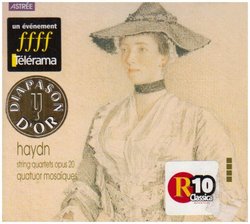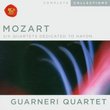| All Artists: Franz Joseph Haydn, Mosaïques Quartet, Quatuor Mosaiques Title: Haydn: String Quartets, Op. 20 Members Wishing: 1 Total Copies: 0 Label: Astree Release Date: 7/1/2003 Genre: Classical Styles: Chamber Music, Historical Periods, Classical (c.1770-1830) Number of Discs: 2 SwapaCD Credits: 2 UPC: 822186088029 |
Search - Franz Joseph Haydn, Mosaïques Quartet, Quatuor Mosaiques :: Haydn: String Quartets, Op. 20
 | Franz Joseph Haydn, Mosaïques Quartet, Quatuor Mosaiques Haydn: String Quartets, Op. 20 Genre: Classical
|
Larger Image |
CD DetailsSimilar CDs |
CD ReviewsMusic of the highest order Bahij Bawarshi | Beirut, Lebanon | 03/29/2009 (5 out of 5 stars) "I caught the Haydn "bug" after listening to this exceptional set of quartets, music of the highest order. What makes this double CD so special, that it has received the firm support of chamber music enthusiasts and music critics alike, the Penguin Guide Rosette, and the highest awards of Gramophone and the French magazines, Diapason and Telerama? First is the intrinsic worth of Haydn's op. 20, in which Viennese quartet music reached maturity. Some have called it a milestone in the development of composition. The noted British musicologist and expert on Haydn's quartets, Sir Donald Tovey, wrote a long time ago, "With op. 20 the historical development of Haydn's quartets reaches its goal; and further progress is not progress in any historical sense, but simply the difference between one masterpiece and the next. Not all the later works are equally valuable; ... no later set of six quartets, not even op. 76, is on its own plane, so uniformly weighty and so varied in substance as op. 20."
Next in consideration is the performance of the ensemble, Quatuor Mosaiques (QM). Critical reviews have praised the players' technique, precision, and lucidity. The sound they generate through their period instruments is unique and has captured the imagination of the many devotees who collect the ensemble's recordings. It certainly has captured mine; for in the weeks following my first experience of op. 20, I went on to acquire all of QM's Haydn recordings. Was it worth the cost? To someone who likes Haydn's best quartets and takes to the sound and playing of QM, the answer is yes. To someone inclined to jump in, I recommend that you first invest in one set and find out whether it's your sort of music; op. 20 would make a great start. All six quartets of op. 20 are remarkable pieces. Amazingly, only nos. 4, 5 and 6 were included among the so-called Thirty Famous Quartets of Haydn. (Who decreed which thirty, and by what norms did they measure the quartets?) In my opinion, op. 20/2, for example, is as great a quartet as Haydn has written, and shares with the much esteemed 20/5 elements of drama and emotional intensity, and in the finales, wonderful fugues. (The fugue of no. 5 in particular could be mistaken for something by Bach.) Notable in the first movement of no. 2 is how each of the four instruments gets its share playing above the other three. Similarly, one can argue the undoubted merits of op. 20/1 and 20/3. The fourth quartet of the opus may be its most popular; to be savored is the quietly affective adagio that runs for over 11 minutes (as played by QM), possibly the longest single movement of all Haydn quartets; the finale is full of impish good humor. The graceful no. 6 is a happy piece that also includes a fugal finale. Finally, the recorded sound is top-quality. That is always desirable, of course, but essential here, where it's so important for true appreciation of the quartets to discern and follow the different instruments as they weave their way through the music. Quatuor Mosaique as ensemble and the sound engineers have delivered the needed clarity. It all makes for an indispensable chamber music recording to own and relish. " |

 Track Listings (12) - Disc #1
Track Listings (12) - Disc #1



